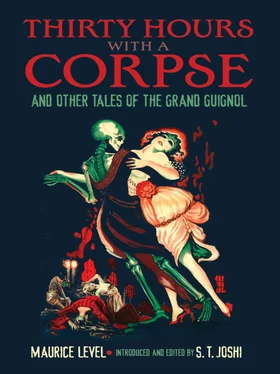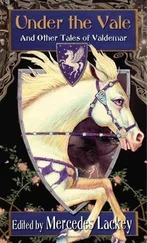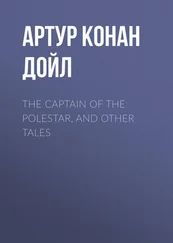“One evening, returning from his office, he said to me: ‘It has come. I am off tonight.’ I wanted to make him up a bundle of clothing, with some linen. But he wouldn’t wait. He scarcely listened to me. At such a time one could almost believe that nothing counts any longer with a man! I had just put the little one to bed. He kissed the boy, he kissed me and then he made for the street on the run. In the street he turned to wave me a goodbye and then jumped into a cab. It was the 31st of July. Since then I have heard no news of him. Without doubt he was killed in one of the first battles. I know neither where, nor how, nor even whether they were able to find and bury him. Not one thing.”
“Perhaps he is a prisoner! How can anybody tell? I have known persons who have gotten news after many months.”
“Oh! I no longer have any hope. It is more than two years, remember. Well, that was to be my fate. At any rate, I have my little boy; he helps me to live. Poor little fellow! A childhood like his is not very cheerful. To see always about the house a sad figure, with reddened eyes! Until recently I didn’t care to go out. Then I decided to take him to the picture shows in order to amuse him. The picture show is not like the theatre. One can go to it, even if one is in mourning.”
The electric bell sounded. The people took their places again. A soldier passed by. He wore a military medal, the Croix de Guerre. The child, leaning over to his mother, asked:
“Is he like that, my papa?”
She stroked his hair softly.
“Yes, my dear.”
“With medals like that, too?”
For a child a brave soldier ought always to have medals. The mother answered:
“Yes, dear.”
With his head turned, his hand in his mother’s hand, the child gazed eagerly at the soldier.
The lights went out and a picture title appeared on the screen.
“The War in 1914.”
“Are we going to see the war?” asked the child.
“Yes, my dear. Look.”
At first streets were shown—a chaos of half-demolished houses, beams smashed, walls shattered, a mass of black ruins almost without form.
“What is that?” asked the child.
“A village.”
“That a village? There is nothing there.”
But a dog ran about among the ruins, and a little boy also, who stumbled over the stones. Then came a wide plain. The shells had dug enormous holes in it and along the road as far as the eye could reach—even to the horizon, where heavy clouds of smoke gathered and then dissolved—one could see only the big trees, razed almost to the ground, tumbled right and left among the fields. On the trunks, already dead, some leaves still fluttered in the wind.
“And that? What is that?” asked the child.
“The country, my dear.”
“Is that the country? There is nothing there.”
“It was beautiful once,” said the mother, trembling. “The Germans have destroyed everything.”
The boy gave a sidelong glance at the soldier.
But already, in another film, troops defiled. In a heavy rain cavalrymen trotted along the roads bordered by ruins, field artillery guns were dragged at a gallop, jolting, rolling, plunging into and rising out of the ruts. In passing one saw the artillerymen laugh and the officers lift their arms, turning in their saddles.
“What is that?” asked the boy.
“The pursuit, my dear,” murmured the mother, pressing him close against her.
“Are they running after the Boches to capture them?”
“Yes, my dear.”
And behind the cavalrymen appeared the infantrymen, spattered with mud, their shoulders sagging under their heavy packs.
“Are they going to fight?” the child asked.
“Yes, dear.”
To her all the soldiers were like her poor, missing husband. In their ranks, under each helmet, in each movement, it was he whom she saw. And the little fellow, more collected, more grave, asked in an almost inaudible voice:
“Was papa like that?”
Then when all—artillerymen, cavalrymen and infantrymen— had passed, a long file of prisoners appeared. One saw them first fleeing under the fire of their own cannon to our lines, then in the camps, then in huddled groups about the coffee kettles. Some were very young and others were old; some with stupefied faces and a melancholy bearing, others with an air of insolence. Still others lay on the ground, a miry horde, conquered, disarmed. The mother sighed.
“See them. Look at them well, my son. They are Boches.”
And the film unrolled their story. They were neither presentable nor brilliant. They were no longer swaggerers. Famished, gesticulating, jostling one another, they crowded about a French soldier, who was distributing rations, and as they got their allowance they scattered to eat it, shamefacedly and apart.
“Are they soldiers?” asked the child.
But the mother was weeping too much to answer.
Suddenly among those downcast figures a bestial and joyous figure appeared. He was a clean-shaven trooper, his cap over his ear, who, in the face of the public, alone on the screen, cynically, his eyes batted, his cheeks protruding, consumed with huge bites his piece of bread.
“Oh, mama,” said the child. “Mama, see how ugly that one is.”
And the mother, having looked up through her tears, gave a cry—a terrible, heartrending cry.
For that German glutton, that man who laughed at the hate of a whole hallful of people, was her husband—her husband, who, she believed, had died in our ranks.
SHE LISTENED, her elbow on the table, her chin in her hands. While he spoke he gazed at her with eager eyes—the eyes of amorous youth. He was telling her the story of his life—of his brief memories of boyhood, of college, the ending of his studies; the war, his ardent desire to fight, his mother’s fears and, finally, his dream of fighting realized.
She interrupted him:
“How old are you?”
“Eighteen years.”
She smiled and laid her finger on the narrow ribbon which he wore on his coat.
“What is this?”
“That is the emblem of those wounded in battle.”
“Have you been wounded?”
“Yes,” he answered, without attaching any importance to it.
Moved by the thought of this mere boy stricken down, lying in a ditch, she murmured, with an air of almost maternal interest and concern:
“Poor little fellow! And when were you wounded?”
“At the Marne.”
“Was it a serious wound?”
He answered negligently, pointing to his breast:
“A piece of shell went through there.”
And as she insisted, anxious to have all the details, he told her what he knew about the war: The hard retreat; the triple daily marches to the rear; then the advance, the roads encumbered with wreckage and bodies, the trees uprooted; the men struggling against fatigue and sleep and able to see nothing ahead of them but a dead plain and a gray horizon; the sudden thunder of the artillery; the blow which one never sees or knows of, but which strikes one to the ground; then the awakening to consciousness at a relief station, removal to a distant hospital, long months of rest under a gracious sky, convalescence and, finally, the furlough home.
She took one of his hands in hers and repeated:
“Poor little fellow! And will you return to the front?”
“I hope to.”
They got up. The wood, this springtime night, was filled with shadows and perfumes. She walked along, leaning on his arm, stroking with her ungloved hand the rude cloth of his cloak. At moments, when the moon shone on them from between the trees, she glanced admiringly at his delicate little figure, his shining eyes and his beardless cheeks. He scarcely spoke now, forgetting the war, surrendering himself to the tenderness of the moment, seeking words and promises, but finding only soft pressures and sighs with which to express the feelings of his heart.
Читать дальше












